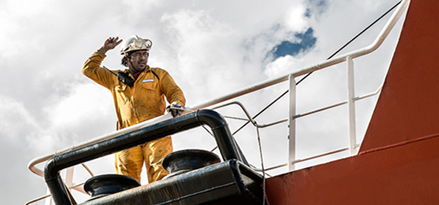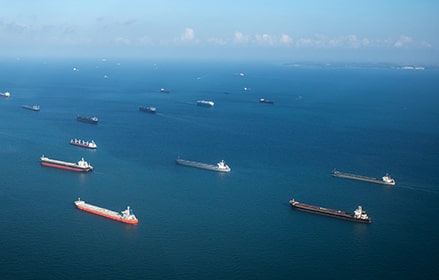Protecting against the impact of vessel lay-ups on marine fuel | ExxonMobil Marine
- 3/9/2020

Protecting against the impact of vessel lay-ups on marine fuel
John LaRese, ExxonMobil, Marine Fuels Technical Advisor
The Covid-19 pandemic has significantly disrupted the demand for both consumer goods and cruise holidays. As a result, many ship owners have chosen to lay up vessels until travel restrictions ease and the demand for freight trade returns.
Taking a ship out of service can be complicated and there are a number of important considerations that need to be evaluated prior to any final decision. For example, a hot lay-up, where machinery is kept in operation, is generally the most suitable short- to mid-term option as it ensures quick recommissioning. For longer-term breaks in service a cold lay-up is generally preferred. Here systems and machinery are taken off line and the vessel becomes “electrically dead”; recommissioning therefore takes more time but day-to-day costs are minimised.
That’s not the end of lay-up planning. There are other pertinent fundamentals that ought to be considered, too. Finding the best location to lay up a vessel can be dependent on weather, tides, the availability of support services, mooring arrangements and proximity to routes. In the current climate, however, pre-planning isn’t always possible and there remains little clarity on the timeline for restarting operations, which adds further uncertainties. What is clear, however, is that vessel operators may inadvertently face fuel related issues as a result.
Fuel quality issues
The development of new fuels ahead of IMO 2020 has resulted in a large number of fuel types entering the market, some of which are less stable than others. This risks sediment formation, which can be costly to remedy. A poll conducted during a recent Riviera webinar revealed that ‘poor stability’ was the top fuel quality concern amongst attendees. So what steps can vessel owners take to minimise this issue?
It ought to be possible to store fuel for at least six months before degradation renders it unfit for use. Vessel operators should therefore discuss the situation with their suppliers if they are concerned that their fuel has started to break down quicker than expected. However, the best defence against unforeseen stability issues is to know what you’re buying. Purchasers should therefore ask their suppliers for details of their product to ensure they bunker high quality fuels.
ExxonMobil spent two years developing our IMO 2020-compliant fuel range, EMF.5™. During this time, we subjected it to thorough fit-for-use assessments, which incorporated tests that exceed the requirements of ISO 8217:2017. These included checks for combustion, waxing and stability prior to the final release of the product. Moreover, we continue to carry out on-going evaluations, including periodic assessments in test bed engines as well as trials on board vessel, to ensure our products remain of the highest quality and performance.
A safe re-entry
Getting a vessel out of lay-up requires a detailed and thorough set of processes to get it safely back on line and ready to re-enter service. An appropriate level of maintenance during lay-up will help facilitate this but vessel-specific steps will still be essential. Ensure that your fuel, fuel storage, handing and treatment systems are not overlooked during this planning process.
The recessionary tide will eventually turn and vessels will re-enter service. When this happens our industry mustn’t lose sight of the challenges and opportunities that sustainability will continue to create. Some ship owners are already deciding to scrap obsolescent tonnage but all operators planning to lay up vessels should remember the benefits of bunkering a quality fuel. During the recovery it will be more important than ever to safeguard engine operations.

